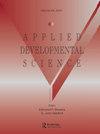Factors that promote positive Chinese youth development: a qualitative study
IF 1.5
3区 心理学
Q3 PSYCHOLOGY, DEVELOPMENTAL
引用次数: 0
Abstract
ABSTRACT How can we help Chinese youth thrive? To begin to address this question, the present study explored the promotive factors (i.e., the individual strengths and environmental assets) that enhance Chinese youths’ healthy development. Interviews were conducted with Chinese adolescents (n = 12), their teachers (n = 12), and their parents (n = 20). Findings highlight six individual strengths, including goal setting, sparks, self-reliance, goal-oriented hard work, self-improvement, and intention to contribute, and four categories of environmental assets, including supportive relational networks, rules and expectations, opportunities and activities, and promotive climates. Some of the promotive factors that emerged are similar to ones identified as relevant to western youth, and others appear to be particular to Chinese youth. Findings have important implications for researchers, practitioners, and policymakers interested in supporting the healthy development of Chinese adolescents.促进中国青年积极发展的因素:一项定性研究
摘要我们如何帮助中国青年茁壮成长?为了解决这个问题,本研究探讨了促进中国青年健康发展的因素(即个人优势和环境资产)。对中国青少年(n=12)、他们的老师(n=12,以及他们的父母(n=20)进行了访谈。研究结果强调了六种个人优势,包括目标设定、火花、自立、目标导向的努力工作、自我完善和贡献意愿,以及四类环境资产,包括支持性关系网络、规则和期望、机会和活动以及促进性氛围。出现的一些促进因素与西方青年相关的因素相似,而另一些似乎是中国青年特有的。研究结果对有兴趣支持中国青少年健康发展的研究人员、从业者和政策制定者具有重要意义。
本文章由计算机程序翻译,如有差异,请以英文原文为准。
求助全文
约1分钟内获得全文
求助全文
来源期刊

Applied Developmental Science
PSYCHOLOGY, DEVELOPMENTAL-
CiteScore
12.00
自引率
2.60%
发文量
23
期刊介绍:
The focus of this multidisciplinary journal is the synthesis of research and application to promote positive development across the life span and across the globe. The journal publishes research that generates descriptive and explanatory knowledge about dynamic and reciprocal person-environment interactions essential to informed public dialogue, social policy, and preventive and development optimizing interventions. This includes research relevant to the development of individuals and social systems across the life span -- including the wide range of familial, biological, societal, cultural, physical, ecological, political and historical settings of human development.
 求助内容:
求助内容: 应助结果提醒方式:
应助结果提醒方式:


